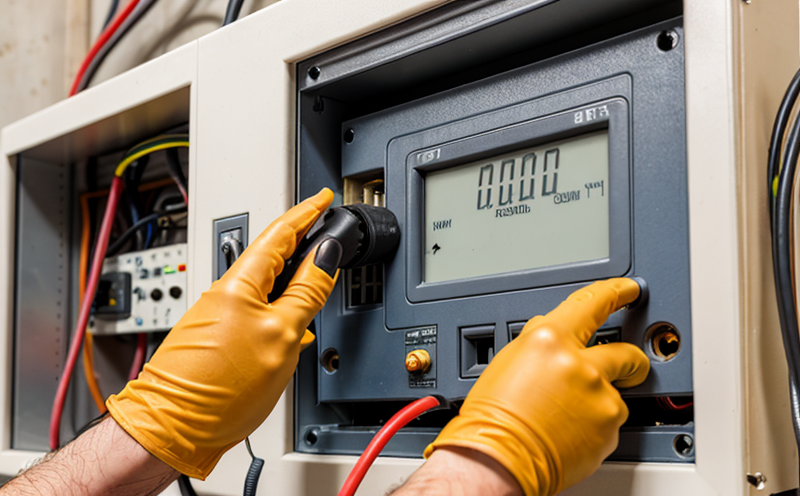SAE J2289 Electrical Functional Testing of EV Batteries
The SAE J2289 standard is a comprehensive and stringent method used to evaluate the electrical functional integrity of electric vehicle (EV) batteries. This test ensures that the battery can function as intended under various operating conditions, contributing significantly to the safety, reliability, and performance of an EV.
SAE J2289 focuses on testing the electrical connections within the battery pack, ensuring they are free from defects and capable of delivering expected power outputs. The test involves multiple phases that simulate real-world scenarios encountered by EV batteries during their lifecycle. This includes high-temperature cycling, low-temperature storage, and various charge/discharge cycles.
The standard is particularly important for quality managers and compliance officers as it aligns with international standards such as ISO and ASTM, providing a robust framework to ensure product reliability. For R&D engineers and procurement teams, this test offers valuable insights into the performance of new battery technologies, allowing them to make informed decisions regarding material selection and process optimization.
The testing procedure involves several critical steps that are both rigorous and precise. The first step is the initial state-of-charge (SOC) measurement, followed by the charge and discharge cycles which simulate the actual use conditions of an EV battery. During these cycles, the test checks for any signs of internal short circuits or open circuits within the battery pack.
Another crucial aspect of SAE J2289 is the monitoring of temperature variations during testing. This ensures that the battery can withstand extreme temperatures without compromising its performance or safety. The standard also includes a series of diagnostic tests to identify any potential issues early in the lifecycle of the battery, which helps prevent costly repairs and replacements.
The results from SAE J2289 are detailed and comprehensive, providing engineers with critical data on the battery's electrical integrity. This information is invaluable for quality control purposes, helping manufacturers ensure that their products meet the highest safety standards. Compliance officers can use these test results to verify that their products adhere to all relevant regulations.
In summary, SAE J2289 Electrical Functional Testing of EV Batteries is a vital tool in the development and production process of electric vehicles. It ensures that batteries are not only reliable but also safe for use under real-world conditions. This testing procedure plays a pivotal role in maintaining the integrity of electrical connections within the battery pack, thereby enhancing overall vehicle performance.
Scope and Methodology
The scope of SAE J2289 encompasses various aspects of EV battery electrical functionality. The standard specifies a series of tests aimed at evaluating the structural integrity and operational capability of the battery under different conditions. These tests are designed to simulate real-world scenarios that an EV battery might encounter during its lifecycle.
- Initial State-of-Charge (SOC) Measurement: This step involves determining the initial state of charge before any testing begins. It helps establish a baseline for subsequent tests.
- High-Temperature Cycling: The battery is subjected to high temperatures to simulate hot climates and ensure it can perform reliably under such conditions.
- Low-Temperature Storage: Exposure to low temperatures ensures the battery remains functional in cold environments, which is crucial for EVs operating in harsh weather conditions.
- Charge/Discharge Cycles: These cycles mimic the actual use of an EV, ensuring that the battery can handle repeated charging and discharging without degradation.
The methodology behind SAE J2289 involves precise control over environmental factors such as temperature and humidity. The tests are conducted in a controlled environment to ensure consistent results. Detailed data is collected throughout each phase of testing, which serves as evidence for the final report.
The acceptance criteria for this test are stringent, ensuring that only batteries meeting these standards are approved for use in EVs. This approach helps maintain high quality and reliability across all electric vehicles produced under SAE J2289 compliance.
Industry Applications
| Application | Description |
|---|---|
| Electric Vehicle Manufacturing | This test ensures that batteries used in electric vehicles meet the highest standards of safety and reliability. |
| Battery Supplier Compliance | Battery suppliers can use this test to ensure their products comply with international standards and regulations. |
| Research and Development | R&D teams can leverage this testing method to develop new battery technologies that meet future demands and safety requirements. |
| Quality Control and Assurance | This test is essential for quality control departments in ensuring batch consistency and identifying any defects early on. |
| Regulatory Compliance | Battery manufacturers must adhere to this standard if they want to comply with international regulations governing EV safety. |
The application of SAE J2289 extends beyond just EV batteries. It also supports the broader industry by ensuring that electrical components within electric vehicles are reliable and safe. This is particularly important given the growing demand for sustainable transportation solutions.
Why Choose This Test
- Comprehensive Evaluation: SAE J2289 provides a thorough assessment of electrical connections in EV batteries, ensuring they are reliable and safe.
- International Standards Compliance: The test aligns with global standards, making it suitable for international markets.
- Early Defect Detection: By identifying potential issues early in the lifecycle of the battery, this test helps prevent costly repairs and replacements.
- Data-Driven Decisions: The detailed data collected during testing provides valuable insights that can inform design improvements and process optimizations.
- Enhanced Safety: This testing ensures that EV batteries meet stringent safety requirements, contributing to the overall safety of electric vehicles.
- Informed Compliance: Battery manufacturers can use this test results to ensure their products comply with all relevant regulations.
Choosing SAE J2289 Electrical Functional Testing for EV Batteries is a strategic decision that supports the continuous improvement of electric vehicle technology. It ensures that manufacturers deliver safe, reliable, and efficient batteries, which are vital components in the transition to sustainable transportation solutions.





